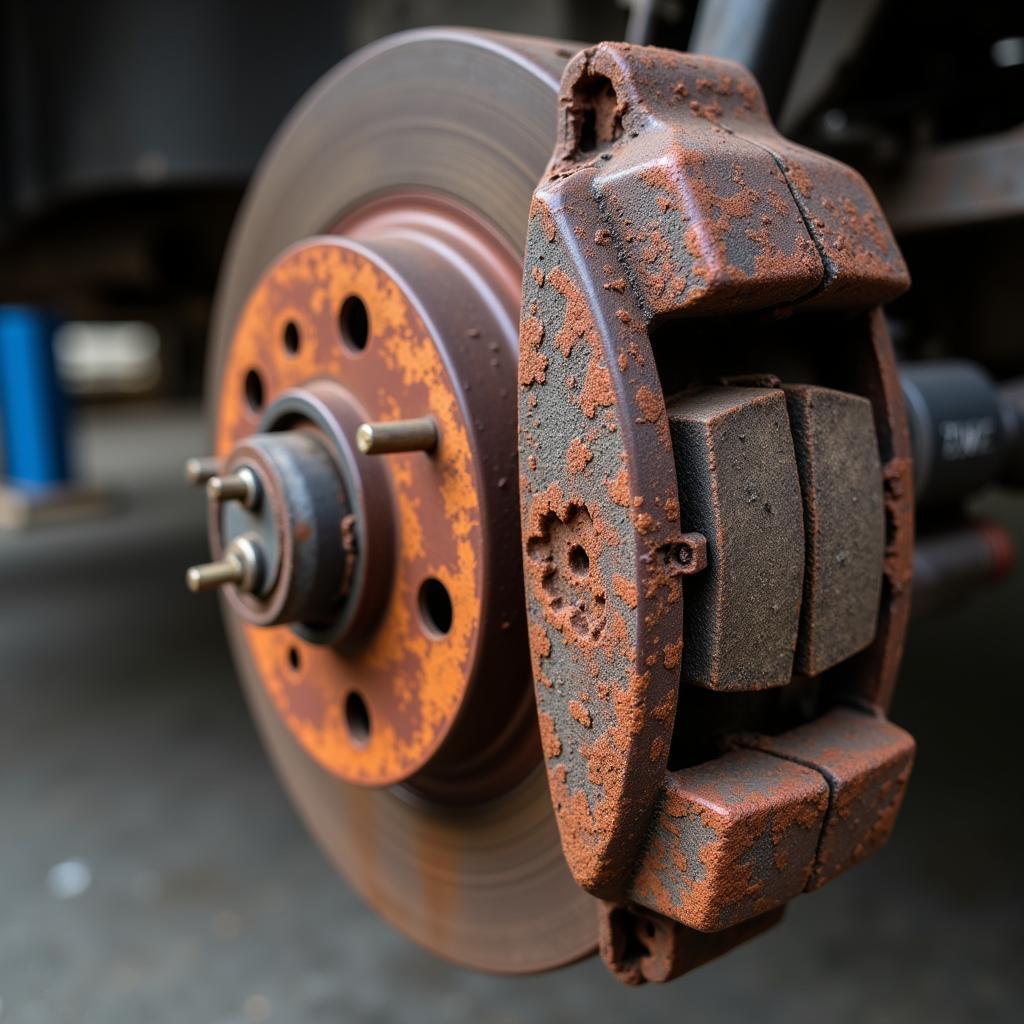If you’re experiencing the annoying sensation of your car front brakes slightly rubbing while not depressed, you’re not alone. This issue can range from a minor annoyance to a potential safety hazard. This article will guide you through diagnosing and fixing this common brake problem, helping you get back on the road safely and quietly.
Understanding Brake Rubbing
Brake rubbing occurs when the brake pads maintain contact with the rotors even when you’re not applying the brakes. This can lead to reduced fuel efficiency, premature wear of brake components, and even overheating. A slight rubbing sound might be barely noticeable, but it’s important to address it before it escalates into a bigger problem.
Common Causes of Front Brake Rubbing
Several factors can contribute to car front brakes slightly rubbing while not depressed. Let’s explore the most frequent culprits:
Sticking Brake Caliper
One of the most common causes is a sticking brake caliper. The caliper piston can seize due to corrosion, dirt, or a failing seal, preventing the pads from fully retracting.
Stuck Slider Pins
Slider pins allow the caliper to move freely. If these pins become corroded or seized, they can restrict caliper movement and cause the pads to rub against the rotors.
Collapsed Brake Hose
A collapsed brake hose can restrict brake fluid flow, preventing the caliper from releasing pressure on the pads.
Warped Rotors
Warped rotors create an uneven surface, leading to intermittent contact between the pads and rotors. This can result in a rubbing sensation, often accompanied by a pulsating brake pedal.
Incorrectly Installed Brake Pads
Improperly installed brake pads, especially if they are not seated correctly in the caliper, can cause rubbing against the rotors.
 Sticking Brake Caliper Causing Rubbing
Sticking Brake Caliper Causing Rubbing
Diagnosing the Problem
Before you start any repairs, it’s crucial to pinpoint the exact cause of the rubbing. Here’s a step-by-step guide:
-
Check for Overheating: Feel the temperature of each wheel hub after driving. A significantly hotter hub on one side indicates a potential problem with that brake.
-
Inspect the Caliper: Visually examine the caliper for signs of corrosion, leaks, or damage.
-
Check the Slider Pins: Remove the caliper and inspect the slider pins for corrosion or seizing. Try moving them back and forth; they should slide smoothly.
-
Inspect the Brake Hose: Look for kinks, cracks, or bulges in the brake hose. A collapsed hose can often be identified by squeezing it; it should feel firm and not collapse easily.
-
Check for Warped Rotors: Inspect the rotors for any signs of warping or uneven wear.
Fixing Car Front Brakes Slightly Rubbing While Not Depressed
Depending on the diagnosed cause, the solution can range from simple cleaning and lubrication to replacing components.
Caliper Issues:
-
Cleaning and Lubrication: If the caliper is sticking due to dirt or minor corrosion, cleaning and lubricating the caliper piston and slider pins can often resolve the issue.
-
Caliper Replacement: A severely corroded or damaged caliper should be replaced.
Slider Pin Issues:
-
Cleaning and Lubrication: Clean and lubricate the slider pins with specialized brake grease.
-
Slider Pin Replacement: If the pins are damaged, they should be replaced.
Brake Hose Issues:
- Brake Hose Replacement: A collapsed or damaged brake hose must be replaced.
Rotor Issues:
- Rotor Resurfacing or Replacement: If the rotors are warped, they can sometimes be resurfaced. However, if the warping is severe or the rotors are too thin, they should be replaced.
Brake Pad Issues:
- Reinstall Brake Pads: Ensure the brake pads are correctly installed and seated properly in the caliper.
Expert Insights
“Brake rubbing, even if slight, shouldn’t be ignored,” says John Miller, a seasoned automotive technician with over 20 years of experience. “It’s a sign that something isn’t right, and addressing it early can prevent more costly repairs down the line.” He further emphasizes, “Regular brake maintenance, including inspections and cleaning, can significantly reduce the likelihood of encountering this issue.” Additionally, according to brake specialist, Maria Sanchez, “Always use high-quality brake components and follow manufacturer specifications when performing brake repairs.”
Conclusion
Addressing car front brakes slightly rubbing while not depressed is essential for both safety and vehicle longevity. By understanding the potential causes and following the diagnostic and repair steps outlined in this article, you can effectively fix the issue and enjoy a smooth and quiet ride. If you’re uncomfortable tackling this repair yourself, it’s always best to consult a qualified mechanic. Need assistance? Connect with the experts at AutoTipPro. Call us at +1 (641) 206-8880 or visit our office at 500 N St Mary’s St, San Antonio, TX 78205, United States.




Leave a Reply